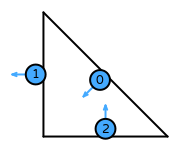an encyclopedia of finite element definitions
Degree 0 Hellan–Herrmann–Johnson on a triangle
◀ Back to Hellan–Herrmann–Johnson definition page
- \(R\) is the reference triangle. The following numbering of the sub-entities of the reference cell is used:
- \(\mathcal{V}\) is spanned by: \(\left(\begin{array}{cc}\displaystyle 1&\displaystyle 0\\\displaystyle 0&\displaystyle 0\end{array}\right)\), \(\left(\begin{array}{cc}\displaystyle 0&\displaystyle 1\\\displaystyle 1&\displaystyle 0\end{array}\right)\), \(\left(\begin{array}{cc}\displaystyle 0&\displaystyle 0\\\displaystyle 0&\displaystyle 1\end{array}\right)\)
- \(\mathcal{L}=\{l_0,...,l_{2}\}\)
- Functionals and basis functions:

\(\displaystyle l_{0}:\mathbf{V}\mapsto\displaystyle\int_{e_{0}}|{e_{0}}|\hat{\boldsymbol{n}}^{\text{t}}_{0}\mathbf{V}\hat{\boldsymbol{n}}_{0}\)
where \(e_{0}\) is the 0th edge;
and \(\hat{\boldsymbol{n}}_{0}\) is the normal to facet 0.
\(\displaystyle \mathbf{\Phi}_{0} = \left(\begin{array}{cc}\displaystyle 0&\displaystyle - \frac{1}{2}\\\displaystyle - \frac{1}{2}&\displaystyle 1\end{array}\right)\)
This DOF is associated with edge 0 of the reference cell.
where \(e_{0}\) is the 0th edge;
and \(\hat{\boldsymbol{n}}_{0}\) is the normal to facet 0.
\(\displaystyle \mathbf{\Phi}_{0} = \left(\begin{array}{cc}\displaystyle 0&\displaystyle - \frac{1}{2}\\\displaystyle - \frac{1}{2}&\displaystyle 1\end{array}\right)\)
This DOF is associated with edge 0 of the reference cell.
\(\displaystyle l_{1}:\mathbf{V}\mapsto\displaystyle\int_{e_{1}}|{e_{1}}|\hat{\boldsymbol{n}}^{\text{t}}_{1}\mathbf{V}\hat{\boldsymbol{n}}_{1}\)
where \(e_{1}\) is the 1st edge;
and \(\hat{\boldsymbol{n}}_{1}\) is the normal to facet 1.
\(\displaystyle \mathbf{\Phi}_{1} = \left(\begin{array}{cc}\displaystyle 1&\displaystyle - \frac{1}{2}\\\displaystyle - \frac{1}{2}&\displaystyle 0\end{array}\right)\)
This DOF is associated with edge 1 of the reference cell.
where \(e_{1}\) is the 1st edge;
and \(\hat{\boldsymbol{n}}_{1}\) is the normal to facet 1.
\(\displaystyle \mathbf{\Phi}_{1} = \left(\begin{array}{cc}\displaystyle 1&\displaystyle - \frac{1}{2}\\\displaystyle - \frac{1}{2}&\displaystyle 0\end{array}\right)\)
This DOF is associated with edge 1 of the reference cell.
\(\displaystyle l_{2}:\mathbf{V}\mapsto\displaystyle\int_{e_{2}}|{e_{2}}|\hat{\boldsymbol{n}}^{\text{t}}_{2}\mathbf{V}\hat{\boldsymbol{n}}_{2}\)
where \(e_{2}\) is the 2nd edge;
and \(\hat{\boldsymbol{n}}_{2}\) is the normal to facet 2.
\(\displaystyle \mathbf{\Phi}_{2} = \left(\begin{array}{cc}\displaystyle 0&\displaystyle \frac{1}{2}\\\displaystyle \frac{1}{2}&\displaystyle 0\end{array}\right)\)
This DOF is associated with edge 2 of the reference cell.
where \(e_{2}\) is the 2nd edge;
and \(\hat{\boldsymbol{n}}_{2}\) is the normal to facet 2.
\(\displaystyle \mathbf{\Phi}_{2} = \left(\begin{array}{cc}\displaystyle 0&\displaystyle \frac{1}{2}\\\displaystyle \frac{1}{2}&\displaystyle 0\end{array}\right)\)
This DOF is associated with edge 2 of the reference cell.